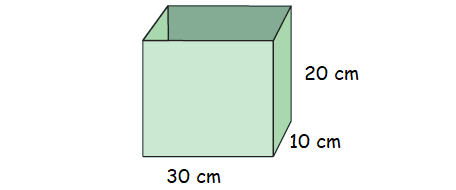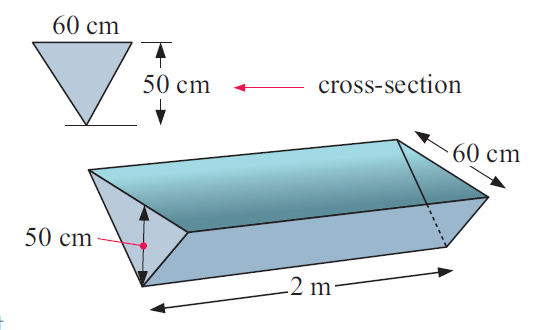VOLUME AND CAPACITY WORD PROBLEMS
The units for capacity and the units for volume are closely related.
1 mL of fluid will fill a cube 1 cm x 1 cm x 1 cm.
1 cm3 has capacity 1 mL
1 L of fluid will fill a cube 10 cm x 10 cm x 10 cm.
1000 cm3 has capacity 1 L
1 kL of fluid will fill a cube 1 m x 1 m x 1 m.
1 m3 has capacity 1 kL.
1 cm3 = 1 mL
1000 cm3 = 1 L
1 m3 = 1 KL
Example 1 :
Calculate the capacity of the container:

Solution :
Volume of the container = 30 x 10 x 20 cm3
= 6000 cm3
1 cm3 = 1 mL
= 6000 mL
1000 ml = 1 L
= (6000/1000) L
= 6 L
So, the capacity of the container is 6 L.
Example 2 :
Find the capacity in liters of a fish tank 2 m by 1 m and 50 cm.
Solution :
Volume of tank = l x w x h
Substitute l = 2, w = 1 and h = 50 cm or 0.5 m.
= 2 x 1 x 0.50
= 1 m3
1 m3 = 1 KL
So, capacity of the tank is 1 KL.
Example 3 :
A rectangular petrol tank has dimensions 50 cm by 40 cm by 25 cm. How many liters of petrol are needed to fill it?
Solution :
Volume of rectangular tank = l x w x h.
Substitute l = 50, w = 40 and h = 25.
= 50 x 40 x 25
= 50000 cm3
1000 cm3 = 1 L
= 50000/1000
= 50 L
So, the capacity of the petrol tank is 50 L.
Example 4 :
A water trough has triangular cross-section as shown. Its length is 2 m.
Find:
a) the area of the triangle in cm2
b) the volume of space in the trough in cm3
c) the capacity of the trough in :
i) litres ii) kilolitres.

Solution :
Area of triangle :
= (1/2) ⋅ base ⋅ height
Base = 60 cm and height = 50 cm
= (1/2) ⋅ 60 ⋅ 50
= 1500 cm3
Volume of space :
= (1/2) ⋅ Base area x height
= (1/2) ⋅ 1500 ⋅ 200
= 300000 cm3
1000 cm3 = 1 L
Capacity :
= 300000/1000
= 300 Liter
So, capacity of triangular prism is 300 liter.
1m3 = 1 KL
1000 ml = 1 kl
= 300/1000
= 0.3 kl
So, capacity of triangular prism is 0.3 kl.
Example 5 :
Find the capacity in megaliters of a reservoir with a surface area of 1 hectare and an average depth of 2.5 meters.
Solution :
1 hectare = 10000 m2
Volume = Surface area x height
= 10000 x 2.5
= 25000 m3
1 m3 = 1 KL
= 25000 KL
Capacity = 25000/1000 ML
= 25 ML
So, the capacity is 25 ML.
Example 6 :
A kidney-shaped swimming pool has surface area 15 m2 and a constant depth of 2 meters. Find the capacity of the pool in kiloliters.
Solution :
Volume = Surface area x height
Surface area = 15 m2 and height = 2 m
= 15 x 2
= 30 m3
1 m3 = 1 KL
= 30 KL
So, the capacity is 30 KL.
Example 7 :
A lake has an average depth of 6 m and a surface area of 35 ha. Find its capacity in megaliters.
Solution :
1 hectare = 10000 m2
35 hectare = 350000 m2
Height = 6 m
Volume = Surface area x height
= 350000 x 6
= 2100000 m3
1 m3 = 1 KL
= 2100000 Kl
1 ML = 1000 KL
= 2100000/1000 ML
= 2100 ML
So, the capacity of the tank is 2100 ML.
Kindly mail your feedback to v4formath@gmail.com
We always appreciate your feedback.
©All rights reserved. onlinemath4all.com
Recent Articles
-
Digital SAT Math Problems and Solutions (Part - 150)
Apr 25, 25 11:46 AM
Digital SAT Math Problems and Solutions (Part - 150) -
AP Calculus AB Problems with Solutions (Part - 19)
Apr 24, 25 11:10 PM
AP Calculus AB Problems with Solutions (Part - 19) -
AP Calculus AB Problems with Solutions (Part - 18)
Apr 24, 25 11:06 PM
AP Calculus AB Problems with Solutions (Part - 18)
